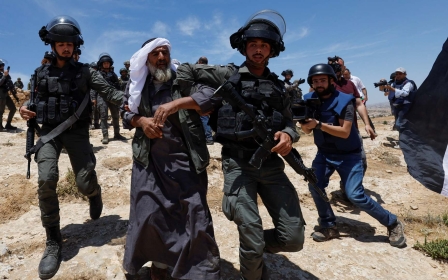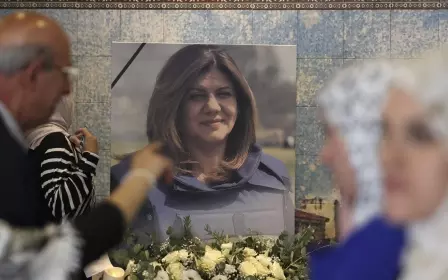Muslims in the White House: Cosying up or making a difference?

When Morsheda Kabir first got an email from the White House inviting her to its annual Eid celebration, she figured it was spam.
After further investigation, she understood that it was a legitimate invitation, so a few days before the Eid celebration, she RSVP'd. On 1 May, she was on her way to 1600 Pennsylvania Avenue.
Kabir was one of the estimated 400 Muslims that attended the Eid celebration at the White House honouring “inspiring Muslim Americans who are making contributions across our country”.
On that Monday evening, the White House was packed with Muslim influencers from all over the country. Many of them were young content creators with no political affiliation - people like Kabir, Maryam Ishtiaq, and Zubair Mohammed. Combined, they have hundreds of thousands of followers on social media.
Kabir is a first-generation American and creates food content on social media. Her parents immigrated in the 1980s from a small island in Bangladesh. Her father worked construction jobs while her mother stayed at home and took care of the family. Kabir has no connection to politics, which is why when she got the email, she was surprised.
New MEE newsletter: Jerusalem Dispatch
Sign up to get the latest insights and analysis on Israel-Palestine, alongside Turkey Unpacked and other MEE newsletters
“I didn't think about it just like me as an individual. This was me representing my community, my family, my lineage,” Kabir told Middle East Eye. “It was really great to see that someone saw my content and was influenced enough to feel some way about me to get me into the White House.”
Mohammed, a content creator whose work focuses on men’s fashion, grew up assuming that only political leaders were allowed to go into the White House. So when he received an invitation, he was shocked.
“Our parents came to this country with hopes and dreams. My parents left their homeland to ensure that we had a better education. To come here for a better life for us,” he said.
“We Muslims have a voice and we can make an impact. And we can do that by showing up to things like this.”
But many Muslims don’t agree with that sentiment, as was evident by the backlash on social media. In fact, they believe that Muslims and those affected deeply by the government’s policies should not be “cosying up” to the administration.
Nerdeen Kiswani, a Palestinian activist and the founder of Within Our Lifetime Palestine, believes that those who attended the White House Eid celebration are “sellouts”. She wrote on social media that anti-normalisation doesn’t stop with just Israeli organisations.
“You cannot represent Muslim people or issues if you’re running to eat with and normalise the same powers that bomb Yemen, Palestine, Iraq, Afghanistan, and so much more,” she wrote.
The role of influencers
While no one was hired to attend the White House Eid celebration, the invites to influencers were notable.
Moustafa Bayoumi, a professor of English at Brooklyn College, believes that the government holds events like these to be “representative”.
“The government buys its own line that they are a representative democracy. I think they're mostly acting in good faith,” he said. “But the real question is how representative it is. What kind of power do Muslims have to represent themselves within the government rather than just being represented in these superficial kinds of ways?”
He explained that for it to be determined whether or not it is effective for Muslims to get face-time with the government, there needs to be “an either-or situation”. There needs to be an organised campaign in order for that to happen, he said.
'They like to cosy up to the powerful'
- Moustafa Bayoumi, professor
In 2014, Barack Obama was not responding to the demands of the people that Israel stop bombing Gaza. At the time, the Obama administration publicly defended Israel's carrying out of air strikes in Palestine.
At a White House event several years ago, there was an organised campaign by Muslims to not attend that event. Mohamed Khairullah, the mayor of Prospect Park, New Jersey, who was barred from attending the White House Eid celebration after being invited, did not attend the iftar at the time at the White House because of Obama’s stance on Syria.
Similarly, there was an organised campaign by people to not attend Donald Trump’s events because of his animosity towards Muslims. But it’s different when it comes to Joe Biden, Bayoumi explained.
“Biden is a kind of status quo politician when it comes to foreign policy, and foreign policy tends to be the issue that galvanises the Muslim community the most. He hasn't done anything that would seem like it's out of the ordinary for an American president,” he said.
In 2015, the US Department of Homeland Security (DHS) planned on hiring “influencers” to help promote Countering Violent Extremism (CVE), a strategy that recruits people to assist the government in identifying individuals that may be “at risk” of becoming violent extremists. It almost exclusively targets Muslims.
“Together with national networks of experts, peer influencers and credible content producers, we can have enormous impact now. Stopping recruitment means expanding our understanding of the threat to this generation from diverse groups,” a DHS document from 2015 said.
“We must restructure our national CVE efforts toward a framework that is attuned with this demographic and design a system of influence on and offline that can significantly diminish the appeal of extremist ideology.”
But those in communities who have been hurt by these sorts of policies will still attend such events hosted by the same administration.
“They like to cosy up to the powerful,” Bayoumi argues. “It's a tendency that you find among many groups, especially immigrant groups, and especially groups that come from states that have authoritarian structures. It’s a kind of division of power.”
The 'impact' of showing up
Ishtiaq is a content creator focusing on lifestyle, food and motherhood. She believes that attending such events is more beneficial than staying away.
She explained that she’s very aware of the administration’s policies on issues like Israel and Palestine. But in order to make a change, she thinks people need to show up.
“If we don't show up, if people from policy don't show up, if we don't make noise, how are these parts of our country going to change?” she said. “If I don’t show up in that room, I can't ask them to make a change. I can't get close to the people that work on these policies. And so I think the fact that we were even invited is just the beginning.”
For Mohammed, filling spaces like the White House is making an impact. He believes Muslims are making it known that they belong there.
'If I don’t show up in that room, I can't ask them to make a change'
- Maryam Ishtiaq, content creator
“This is our home, too, and we need to be in these spaces. If you’re not showing up, then we are going to be forgotten. We are going to be sidelined,” he explained.
He says he spends hours sending out emails to brands as a content creator. He sends them for months on end. Most times, he won’t hear back. But when he physically attends an event where those brands are in attendance as well, he is able to meet with them in person and it makes more of an impact, he said.
It’s part of the reason why he accepted the invitation to the White House and why he’ll accept it again if he’s invited next year.
“It's important for me to bring my culture and my religion to the forefront,” he said, “and I want people to know who I am as an individual and to know that future generations always have space at the table.”
Middle East Eye reached out to the White House for comment but did not receive a response by the time of publication.
Middle East Eye delivers independent and unrivalled coverage and analysis of the Middle East, North Africa and beyond. To learn more about republishing this content and the associated fees, please fill out this form. More about MEE can be found here.





